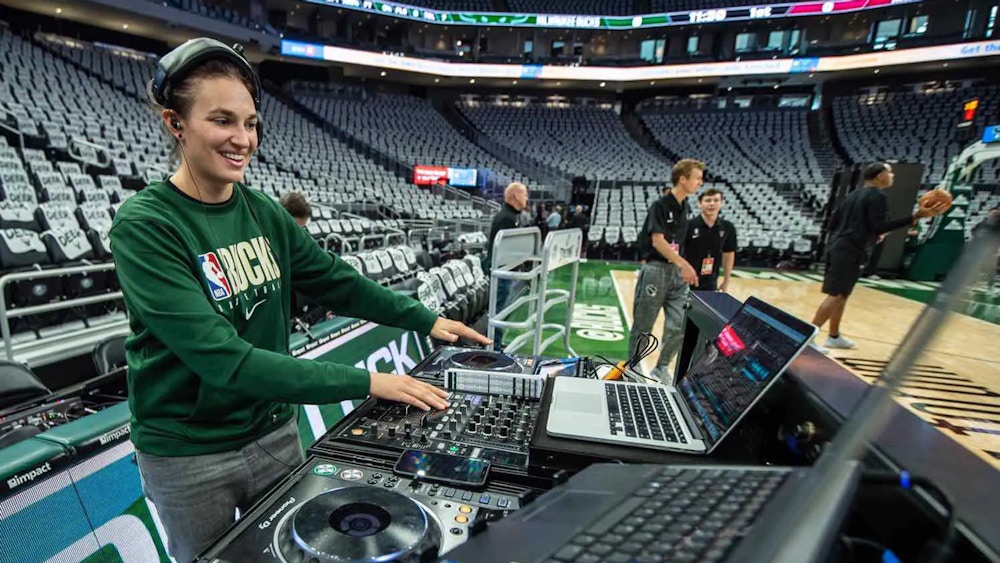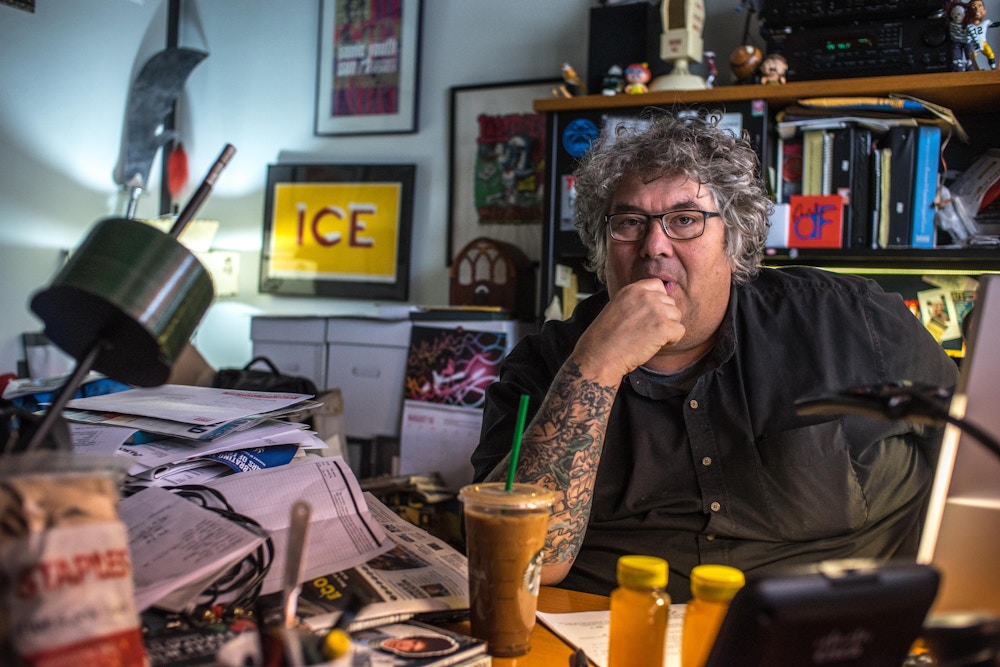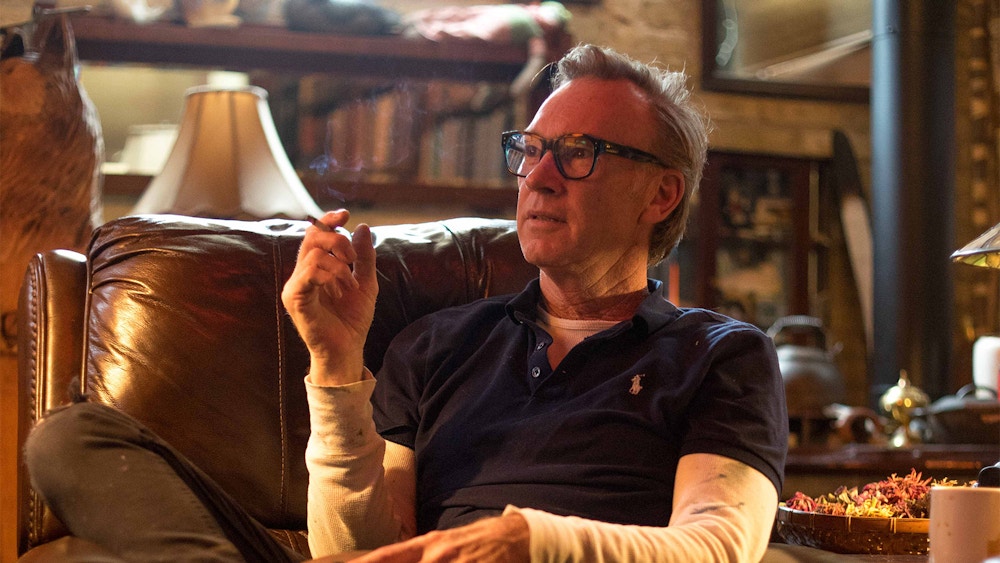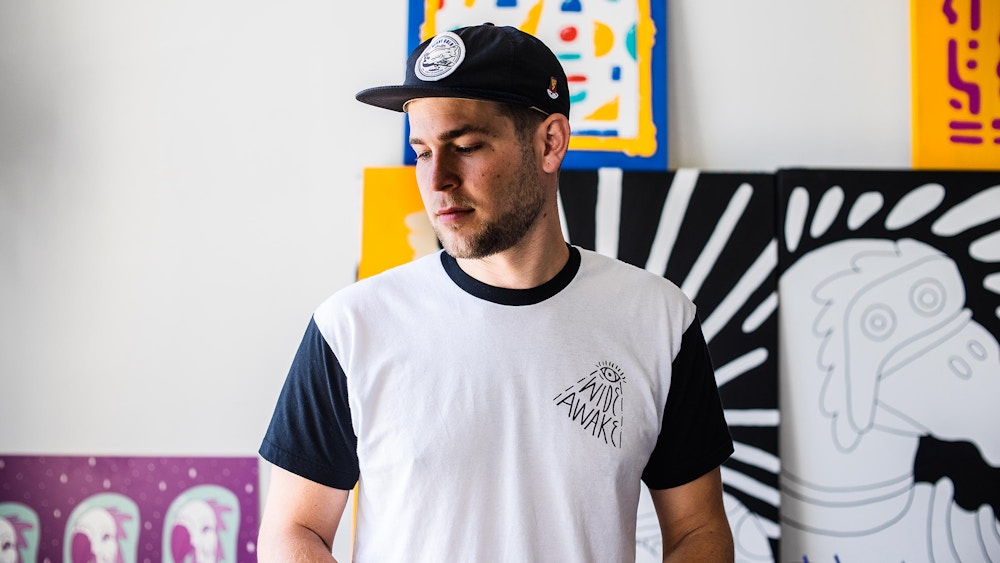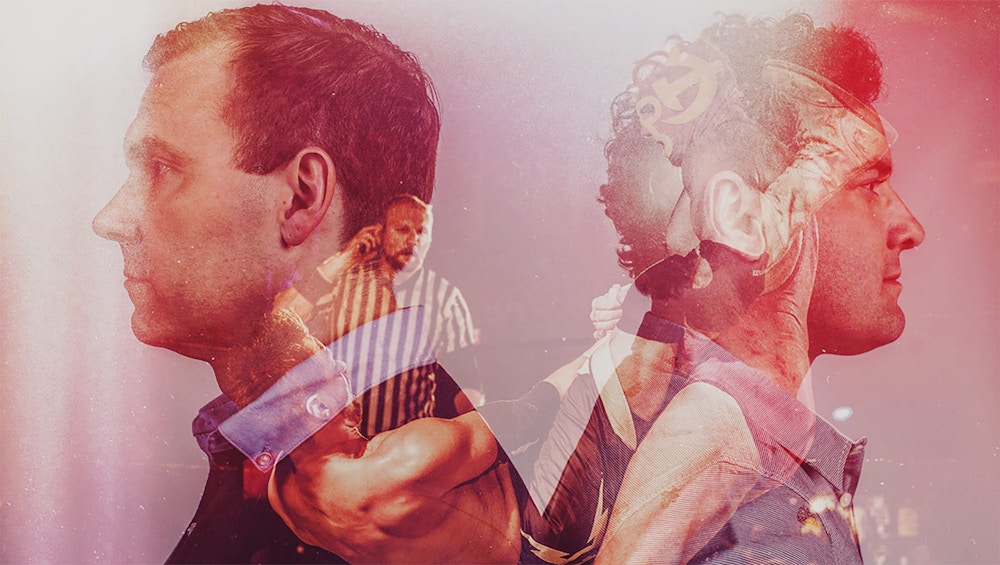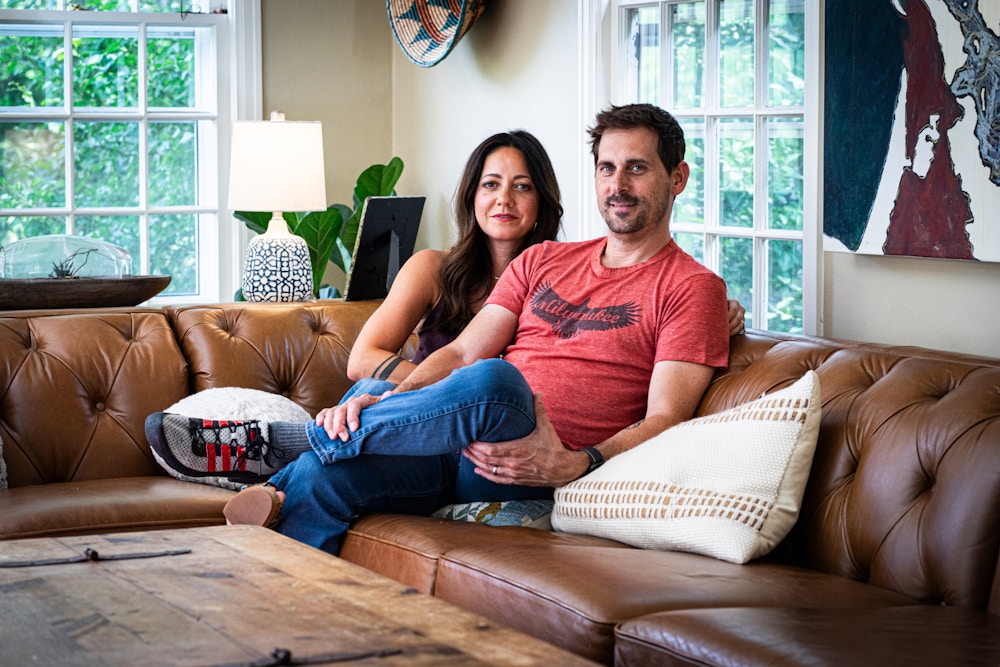
Victor DeLorenzo’s vast experience has taken him around the world. He has played Carnegie Hall, the Royal Albert Hall, and Coachella. He carries “I was the drummer in the Violent Femmes” everywhere he goes.
But don’t let that fool you. His ambitions—musical and otherwise—transcend one band. Albeit a famous one.
I met him on an early spring Friday night in Milwaukee, on Murray Avenue at the classic and newly remodeled The Jazz Estate. Victor and his bandmate Janet Schiff are getting set up and in between sips of a Michter’s on the rocks, I ask Victor if he still gets nervous before gigs.
“Oh, yeah,” he says. “But once the music starts I’m fine.”
Victor and Janet make up the duo NINETEEN THIRTEEN and they’re doing a quick soundcheck before the place fills up in a few hours. Their name came from the year Janet’s cello was made.
They run through a few songs, and they’re measured and loose, precise and freewheeling at the same time. NINETEEN THIRTEEN feels like a mashup of the White Stripes, Medeski Martin & Wood, and Portishead. Victor on drums, Janet on the cello.
The attack on the cello can range from gorgeous beauty to gritty distortion depending on the way you handle a bow, and Janet is a master. Victor provides the perfect counter, a low-key jazz style that feels behind the beat just enough to sway between tension and release. He uses brushes almost exclusively, and his reverence for jazz music comes out when he says that he has “bastardized” the brushes, using them more like actual drumsticks than the traditional “stir the pot” technique so prevalent in jazz.
Bastardized, schmastardized.
Their music, mostly instrumental, feels like the soundtrack to the next great independent film and conjures up images of city streets, shady characters, smoky clubs, and wide landscapes.
Talking to Victor is easy, and he pinballs one enthralling story after the other. He acts as the Femmes band archivist (he kept many artifacts from the band’s history), but the archives in his brain are immense. He was the drummer in what is arguably the most famous band to come from Milwaukee and has had a successful acting career—as a member of Theater X, he performed avant-garde theater in front of New York audiences.
Tonight NINETEEN THIRTEEN will be doing the live debut of what amounts to their theme song, “Cello and Drums Forever.” I love the idea of a band having a theme song, like Cheap Trick’s “Hello There” and Wilco’s “Wilco (The Song).” And of course, there is “Hey, Hey, We’re The Monkees.” “Cello and Drums Forever” is like a David Lynch slow groove road trip through a dark, cigarette smoke-filled alleyway. In it, Victor performs what amounts to a monologue that concludes with him proclaiming in a low whisper “Cello and Drums Forever.” The title giving the band a bumper sticker-ready manifesto.
That night, the rapt audience got what they came for. Three sets of virtually unplugged atmospheric grooves and laid-back set pieces. Some cute between-song banter. After the show, I saw Victor greeting many of the fans, spending time, laughing, talking, gracious. The opportunity to shake hands with a Milwaukee music icon wasn’t lost on any of them.
A few weeks before the show I found myself on another part of Milwaukee’s East Side meeting Victor at his studio on a rainy afternoon. I walked down a sidewalk, through a tiny front yard, and approached a house behind another house. The main house’s address ended in “A” and the studio’s address ended in “B.” It made me think they represented simple chord changes, Victor transitioning between the two. I knock on the “B”, Victor opens the door, and it felt like we were two Italian guys who had known each other forever.
I got the feeling at that moment, that Victor greets everyone that way.
He offers me a Perrier, and I notice that Victor has his phone within arm’s reach. He’s just a bit distracted—his beloved cousin Cree was having heart surgery as we were speaking and he was monitoring family texts.
Cree—for Victor—conjures up fond memories of his childhood in Racine, Wisconsin, where he first caught the bug for acting. Yes, the acting came before the drumming.
“It turned into a fascination when I was in high school,” he told me. “Probably because the music didn't really hit me at first. “Music was just something that accompanied visuals, whether I was watching a theater performance, or I was watching television or a film in the theaters.”
“I kind of liked the idea of having acting be my job.”
He got his first taste of performance as a model in JC Penney catalogs. Victor loved the idea of playing someone other than himself. He found it freeing and challenging
He was lucky to have supportive parents, but living in Racine wasn’t necessarily the fast track to movies. (Although later he did appear in Aswang, possibly the first independent film made in Milwaukee—that’s a story for another time). While he appeared in a few grade school productions, it wasn’t until high school that he met his first mentor, Father Russell Roetzer, who believed in the artistic value of the theater. “He would bring us up here to the Milwaukee Rep to see plays,” says Victor. It started to cement the thought that he could be an actor. “The priest even thinks it's a good thing to do,” he said—and as two guys who grew up in Catholic school, it all made sense to me.
But while acting was his focus, a chance connection was about to turn one passion into two.
It was the early 70s, and young men were still going off to fight in the Vietnam War. And through a circuitous connection, again tying back to his cousin Cree, he heard of a guy on his way to Vietnam that was selling his drum set. $350 bucks.
“My cousin said, ‘Do you know anybody that would maybe want to buy this drum set to help him out?’ And I said I think I'm interested in buying it.” Victor was a young kid working at the local Holiday Inn and had a little bit of money. “I didn't even comprehend what I was saying,” he remembers. “It was almost like I was surprised when I was saying that to him.”
“I figured I’d help the guy out. Now, I'll have a drum set. What the hell? I think a drum set is a beautiful piece of artwork.”
Victor had the drums but had no idea how to play them. Yet now, there they were, $350 bucks later, sitting in the corner of his basement, unassembled, calling him.
Still an actor at heart, he somehow instinctively knew the drums would become an intrinsic part of his life and his artistic expression.
But acting and drumming are two different things, says Victor. “I think it's two entirely different mindsets, at least for me. There are certain things that you could see similarities in—like, cadence, memorization, and technique. Those things apply to both. But as far as how I found myself, as an actor, or as a musician, they were two different worlds. I mean, sometimes, the two worlds rubbed up against one another. But as far as what I did to achieve it and performance in either one, it was a different set of rules.”
Victor’s first drum teacher, a man named Joe Pulice, introduced Victor to the brushes. “They became a really big part of my style with the Femmes because I took brush playing and bastardized it into a rock form.”
There’s that word bastardized again.
“I came from a tradition of playing brushes in a jazz kind of way. What I needed to play with the Femmes was something a little bit more violent, a little more aggressive. And a little more backbeat.”
After high school, Victor took a year off and played in a band around Racine called Fresh Lettuce. It gave him a taste of what it was like being in a band and honing his chops. But college was in the offing. “I was always of the mind that if I'm going to do something, I'm really going to do it. That's why when I got out of high school, I didn't go to college right away, because I saw a lot of my friends going to college and wasting time and money and then coming back to the scene. So I figured when I go, I really want to go because I really want to learn. And that's what I did.”
He eventually came to UW-Milwaukee and studied theater, comparative literature, and music. An opening to join Theater X appeared, and Victor was dead set on auditioning for the spot. An actor named Willem Dafoe was departing the group, and they needed a replacement.
The problem was that Victor had never auditioned for anything. In Racine, you get all the parts you go for because of the limited talent pool. But for Theater X it was a whole different ballgame. It was competitive. You had to prove yourself.
He was, after all, attempting to become the replacement for who we know now as legendary actor Willem Dafoe.
Victor remembers the crazy set of circumstances that got him into Theater X. “There was a call on the bulletin board in the theater department, a call sheet about Theater X looking for one man and one woman to fill out their company. So they were holding auditions. I figured, okay, I'm gonna go audition. But I've never done an audition.”
“I had read something about the Theatre Guild in Racine holding auditions for a play. So I figured, okay, I'm gonna learn a monologue. I'm gonna go down there, and then I'll at least have one audition under my belt. So I go down there. I do the audition. Turns out the guy that was running the theater not only wanted me for the play, but he also wanted me to be part of the acting company in Racine.”
Victor had to come clean about his intentions.
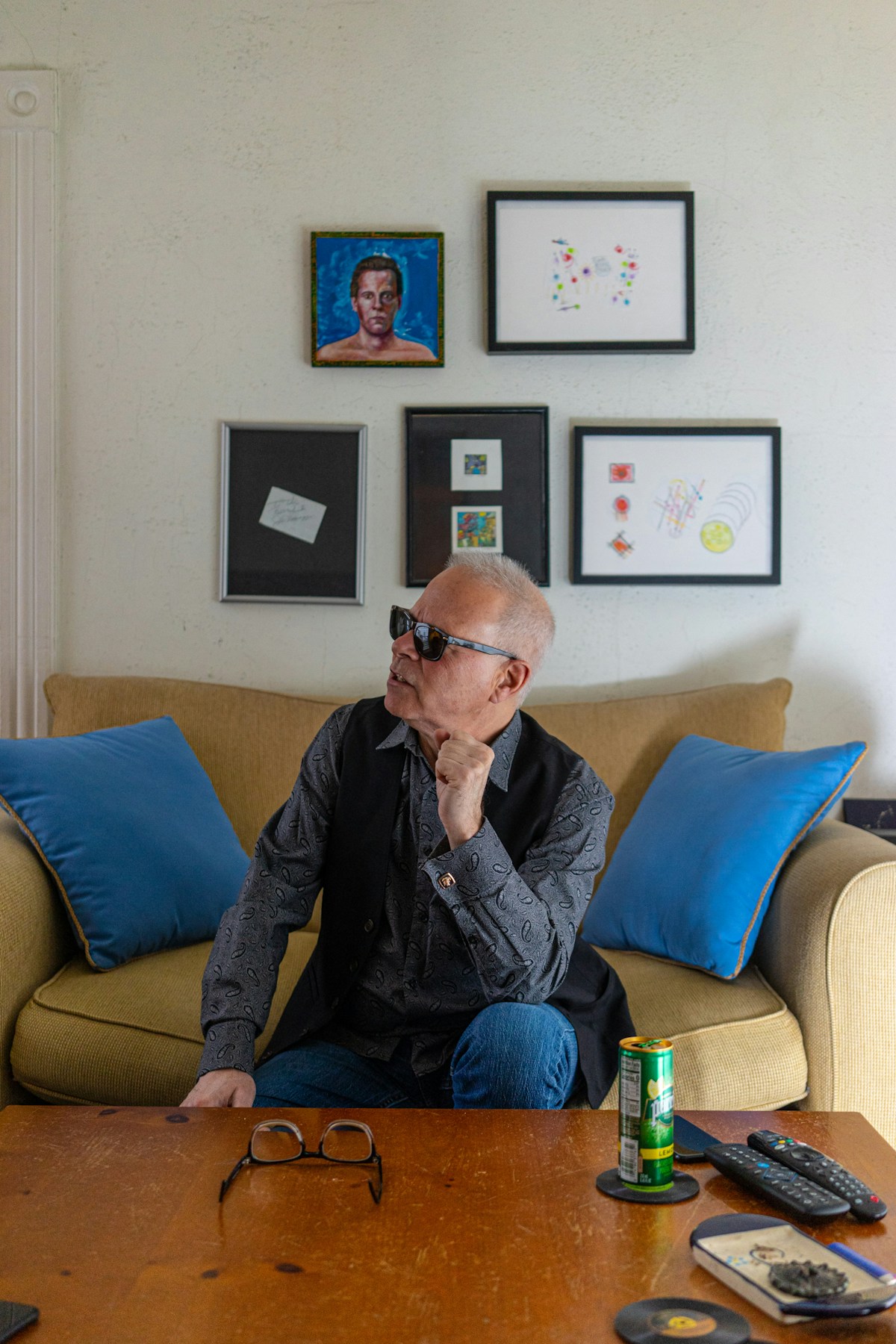
“I was so embarrassed. I had to say, listen, I'm sorry. The only reason I did this audition was that I'm going to do this audition in Milwaukee that I'm really hoping will be successful. I want to be a part of this theater company called Theater X. He totally understood what I was doing. He said this is really smart that you did this. You did a great job and good luck.”
“So I went to Milwaukee and auditioned, and it turned out that I not only got a part in the play, where I was replacing Willem but also a part in the company.”
His acting career taking off had an unexpected impact on his future in music. Post Theater X Dafoe was instrumental in bringing Theater X to perform in New York, and while performing in NYC at The Performing Garage a set director for Theater X named Jerry Fortier asked Victor if he wanted to go to CBGBs after a performance and check out the Dead Boys.
This was kind of a watershed moment in music history. It was the late 70s. Punk, New York, CBGBs. A scene. The counter to disco. Tastes, attitudes, and personalities in music were changing by the minute. Music history was being written.
“We went down there and saw the Dead Boys play, and outside we met Cheetah Chrome, who was part of the Dead Boys. He was outside smoking cigarettes.”
Victor pauses for a second thinking about the moment.
“My music head started firing again.”
Turns out Jerry had a good friend, a budding bass player named Brian Ritchie, and back in Milwaukee was able to arrange a meeting between Victor and Brian. They became fast friends. Brian loved Victor’s drumming style and they both had the same taste in music. They also shared a wicked sense of humor, which I can only assume came in handy when they first heard Gordon Gano’s songs.
Neither had any idea where destiny would take them.
When you hang out with Victor, you realize that the Violent Femmes doesn’t define who he is.
Still, the Femmes were kind of a big thing. But for so many people, fame comes not because you expect it. It kind of just happens to you while you’re working on your craft. That and a few lucky breaks and the universe working perfectly, of course. It all happened to the Femmes.
“I thought it was gonna be just something I was going to do for a summer. It took us all by surprise. It started becoming popular so fast. All I knew was I had two other guys that were like-minded. And we were just having a blast.”
“The transition [from acting to music] was very subtle, so subtle that I didn't even realize it was happening.”
One of the fascinating things about the Violent Femmes is that their instinct to go completely acoustic predates café culture and MTV Unplugged. They had a strange instinctive desire to be ready to play anywhere and in the late 70s they would routinely set up in front of The Oriental Theater and other spots on Milwaukee’s East Side. The instinct to play that way came from an unlikely influence—rockabilly, and the likes of Gene Vincent—an upright bass, drum set, a guitarist, and a ton of attitude.
The acoustic nature of the band made them stand out almost immediately. They famously walked into legendary east side bar Century Hall (which sadly burnt down in 1988) to talk to the booker about a gig.
“We went in, and we wanted to see the person that booked the bands. We were in the office and had our instruments with us. We said we'd like to audition for you right now. And the guy said, ‘Well, you can just leave the cassette on my desk, and I'll get back to you.’ And we said, ‘we have our instruments here, right now. We want to play for you.’ And the guy didn't know what to do.”
Before they went totally acoustic, and even before they met singer and songwriter Gordon Gano, Brian had to get his hands on an acoustic bass. He had heard that Ernie Ball had come out with a modern version of the mariachi bass called the Earthwood. So Victor and Brian headed to Uncle Bob’s Music where a moment of insane serendipity, now looking back, makes you realize that the Femmes were darn near destined for fame.
“We went to Uncle Bob's music store and Brian had some money to put down towards the bass. But he found out it was a special order. I mean, who's gonna order a mariachi bass? Everybody wants a Fender P bass. So, he didn't have enough money to put the deposit down. I think he needed like another $50 or something like that. So we leave Bob's and he's depressed and he's walking to the bus stop. While Brian's walking there, he sees a crumpled-up bag, sitting near the sidewalk. And God knows why but he was impelled to look into the bag.”
“He opens it and finds $60.”
Sometimes the universe just wills things to happen. And Brian grabbed the cash and the two of them walked back into Uncle Bob’s, handed them the down payment, and ordered the bass.
Victor laughs about it. “It was like, either God or Satan was looking out for us.”
Brian had seen Gordon Gano play at the Metropole Club, which used to be on Oakland Avenue in Milwaukee. Victor remembers Brian coming back and saying, “Hey, there's this pint-sized Lou Reed imitator. I think we should play with this guy.” They got together and rehearsed over at the Beneath It All Café, (which is near present-day Café Hollander on Downer Avenue in Milwaukee).
The band played some of the songs that ended up on the first Violent Femmes album that night. “Add It Up.” “Blister in the Sun.” “Gone Daddy Gone.” They were a band. The term “folk punk” was coined, took root, and came to life in these three industrious Milwaukee musicians.

Legend has it that the Violent Femmes were discovered by Chrissie Hynde of The Pretenders. It’s a great story—a nice urban myth—but that’s not exactly how it happened.
They were making the rounds, doing gigs on the east side, and just happened to be playing outside The Oriental Theater the night The Pretenders were doing a show there.
Victor has probably been asked about it a million times but still doesn’t mind telling the story.
“All of a sudden the door opens to the theater and this guy comes out. And he stops and listens to us for a little bit. He's chuckling to himself. And then he makes his way up to The Oriental Drugstore, which was still there at that time. He comes back, listens again. And then he says, ‘Hey, you sound like something that's happening in England right now called the Stray Cats.’”
That guy was Pretender guitarist James Honeyman-Scott. He went back into the theater and came back out with the whole band.
“They're leaning on a car, and they're listening to us. And so we get to this one song called ‘Girl Trouble’ which goes ‘Girl trouble, I've got girl trouble up my ass, girl trouble, I don't know if this is going to pass, I've got grilled trouble up my ass’ Chrissy hears this and she's just laughing. She can't believe it. So after we finish the song, she comes over and says, ‘You guys are fabulous. Are you doing anything tonight?’ And we said no. And she goes, ‘Well, how would you like to come and open the show tonight?’”
Of course, they said yes. Suddenly they found themselves backstage hanging out with The Pretenders, who truth be told, Victor knew very little about. He was a jazz guy, doing his own thing, and not exactly plugged into the music scene at the moment.
Turns out they weren’t the only opening band that night.
“We’re backstage and we’re just hanging out and getting ready to go on. And there's this other band called The Bureau, which is like a horn band from England. They officially open the show. And then there was this break, and the lights go down.”
The enthusiastic crowd thought The Pretenders were coming out. Victor remembers it in all its infamy. “They see these three fuckers. You know, like, what the hell is this? You talk to people now a lot of people say, ‘Yeah, I was there and it was fantastic.’ We played three songs. Maybe halfway through half the people liked us and the other half were like, ‘Get the fuck off, we want The Pretenders.’”
They played the show, and the next day the band was back on the street. “It was no real big deal,” says Victor. Fame actually came after they were invited by Ira Kaplan of Yo La Tengo who was curating a concert series to play a show in New York. He had heard about them from a piece in New York Rocker magazine. The Femmes shared the bill with Richard Hell and the Voidoids, and got an incredible review by Robert Palmer in the New York Times (1982).
“It mentioned Richard Hell, for maybe a paragraph, and talked about us for seven paragraphs,” says Victor.
That review, looking back, was prescient:
The sound that results from this unlikely concatenation echoes all sorts of antecedents, from skiffle music to Dylan to early Velvet Underground to Jonathan Richman to punk rock without the amplification. But most of all, the sound is genuinely new. If the major record labels were less financially strapped and more adventurous, this young and extraordinarily talented band would be some artist-development department's dream-come-true. And they might be anyway, given their catchy material and riveting stage presence. The independent producer Alan Betrock, who produced the first recordings by Blondie and Marshall Crenshaw as well as Richard Hell’s latest album, has been working with them and shopping their demo tapes, which are livelier and more engaging than most bands’ first albums. Stay tuned.
Up on the third floor of Victor’s “B” house is his studio. Wood lines the walls and ceiling, there’s a recording booth with a couple of vintage amps, jazz records neatly piled on tables and against a wall, a couple of vintage guitars and a set of drums in the middle of the room.
He sits behind the drums as if he can’t help himself and plays a bit. He and Janet have recorded tracks for NINETEEN THIRTEEN here, and he is currently working on a project called the Night Crickets, a collaboration with David J of Bauhaus and Love and Rockets. He is recently back from L.A. where they recorded a music video. Their song “Candlestick Park” is a slow groove tribute to the legendary Bay Area stadium where the Beatles played their last concert.
He hasn’t been a part of the Femmes for years now, the band having succumbed to the perils of fame and money and all the cliché things bands fight about. They still tour without him, and Victor has moved on, feeling grateful, fortunate, content. You can feel the aura just hanging around him. Bitterness feels like something Victor the actor would do, not Victor the man.
As our conversation comes to a close, his phone lights up—the family group chat. Cree is out of surgery, and all went well. Victor smiles, a sense of relief comes over him. It’s a reminder that life comes at you fast, and being able to improvise can push you through.
As he has bounced from acting to the Femmes to NINETEEN THIRTEEN and the Night Crickets, his life in many ways has been one big improvisation.
“Improvisation has always been part of my life in so many different ways. A lot of times people have said to me, ‘Wow, how did you have the guts to even do that?’ And I'll say, ‘Well, maybe I don't know any better.’ Or if I perceive something to be within my reach, I’ll go for it. I'm not scared about it. And I think obviously I've been informed by my theory of life in that regard. To be fearless. I don't care if people laugh at me. Or if I make a mistake. I really don't care about that.”
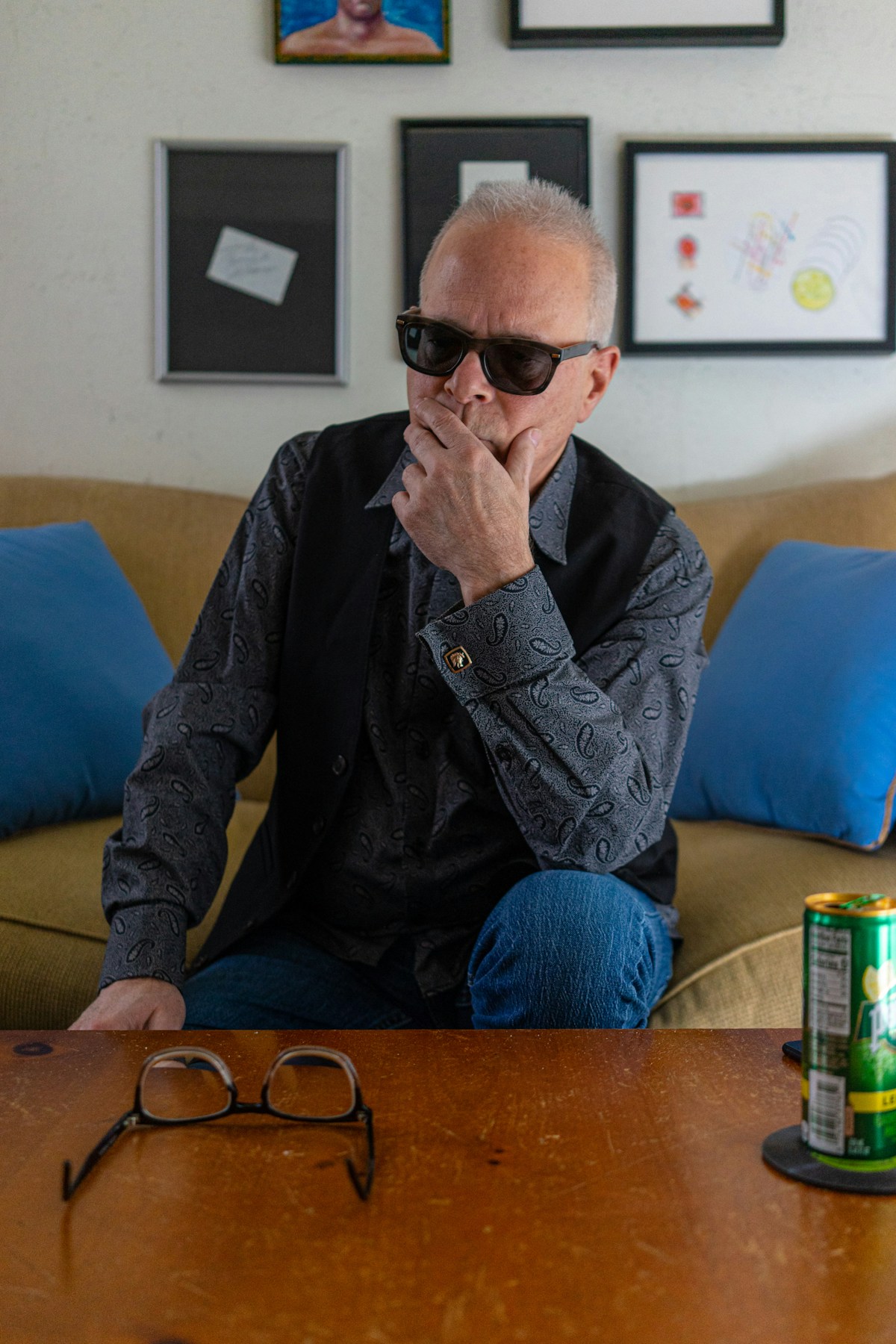
- Photography by Nicholas Pipitone
- Edited by Caitlin Knudsen

